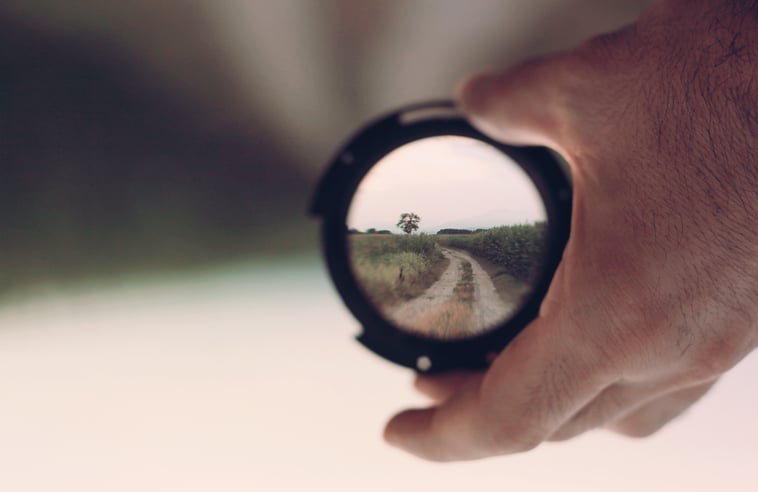
I’ve spent the last 10 years teaching at Algonquin Regional High School—a large, suburban school about 35 miles outside of Boston—and I serve as the social studies department chair as well. But years ago, when I’d just finished student teaching, I wasn’t sure I was on the right path. I was struggling to find a foundation that would guide my teaching and looking for something to confirm I was headed in the right direction.
Student teaching was a rewarding experience, but I still wasn’t sold that the classroom was my life’s calling. And that was definitely scary after spending so much of my life invested in one thing! I remember thinking, “Is this really what I want to do with my life?” If that “aha” moment hadn’t presented itself after student teaching, would it ever? This craft requires us teachers to give our entire selves to our students. That’s not a responsibility to be taken lightly and I certainly didn’t want to give the students I was about to meet for the first time anything less than what they deserved. There was a lot riding on the choices I made next—and I was feeling the pressure.
So, terrified to start teaching and desperate for a spark, I spent the summer before my first year trying to squeeze in some extra professional development. I found Facing History's Holocaust and Human Behavior seminar and spent a week immersed in the content. I completely absorbed their teaching approach of using ourselves as the starting point for understanding history. It’s a circular idea that begins with exploring identity and questions of who we are and how we see the world and other people. It totally transformed the way I saw the practice. I left that weeklong course feeling like what I was going to be doing with my life mattered.
To this day, I rely on the skills I learned to talk about really deep and meaningful things with an approach that’s civil, respectful, and empowering. It has encouraged me to think about why I teach what I do instead of just rolling through the curriculum. Specifically in this subject matter, taking this approach of looking at individual decision-making and how we play a role in history has been revelatory. It’s a foundational framework for every one of my classes.
No matter what you teach, it’s important to find things that unlock a new way of approaching your lessons. For some, it can be through mentorship with a fellow teacher who’s been there, done that, and has years of wisdom to impart. For others, it can be a course, a workshop, or even a piece of uplifting advice. There’s no one-size-fits-all solution for professional development. When you find something that works, chase it down and never let it go. Let it become an integral part of not only your practice, but also yourself.
As a new teacher at the beginning of my career, I found the experience of that seminar to be invaluable. It empowered me to enter the classroom with an assuredness about who I was as an educator. Even now, when I find myself getting lost in textbooks, I can bring myself back to where I’m meant to be as a social studies teacher by remembering that history is happening right now. And just as important, the same goes for students, who are used to framing history as things that happened years, decades, or even centuries ago. But history is not just a story over which we have no control or influence. History has shaped our collective past and present and we’re writing the history of the future every single day.
Venturing into the unknown can be scary, and sometimes we have to deal with difficult topics. In my second year at Algonquin, I pitched the creation of a Holocaust and Human Behavior class, the course I was exposed to during my summer seminar. That’s a heavy topic! As teachers, we sometimes want to avoid tough conversations because we make assumptions that the students don’t know enough to have educated conversations or that they’ll just parrot their parents’ beliefs. But I find that students really want to have a voice and are looking for a safe place to have one. The best learning happens when we’re having these raw and relevant conversations and not just following a lesson plan.
Of course, I know that engaging difficult subject matter is exactly that: difficult. But it’s so important. To avoid repeating the mistakes of the past, we have to help our students understand who made those mistakes and why. We have to engage the human behavior element of history—even amid the atrocities.
I’ve worked to encourage other teachers to take on complex and conflicting events in history and helped them tackle some of the challenges they faced when trying to bring this into the classroom. Together with other teachers, we’ve learned plenty along the way: First, don’t get discouraged. Some teachers have never taught this way so there will be a natural learning curve. Second, develop a classroom contract (and read on to see how I approach this with my students). The benefit of a contract is that it ensures good, respectful conversation—especially when discussing subjects that can be uncomfortable or controversial. Finally, teachers who use this successfully level with their students. Let them know we all hold biases and that it’s worthwhile to pursue understanding anyway. Studying history is an opportunity to understand ourselves and the components of our identities, like race, economic status, and where and when we live. They all influence our worldview and helping your students consider them—no matter the subject—will serve them well beyond a single semester.
I encourage you to pursue a more open approach to teaching—one that places importance not just on the curriculum itself, but also on how your students interact with and complement it. It has made my practice richer and my students’ learning deeper. Students come back to me year after year—even students off in college—talking about how this way of learning made an impact on their lives. It has given them a voice and has shown them their opinions really do matter. By teaching students their voices are important when they’re 15, 16, or 17 we can help make sure they’ll be out there shaping history by the time they’re in their 30s and 40s.
That’s the beauty of this: I’m not telling students which side to take, I’m just telling them they deserve to be heard.
5 Tips for Developing a Classroom Contract:
-
Start with journal entries: My students typically start by writing a journal entry that details both an environment where they felt comfortable sharing their thoughts and one where they didn’t. Then, in small groups, they try to identify features of a positive and negative environment.
-
Set ground rules: After group sessions, we take the smaller lists and establish a larger list. We talk about classroom conversations, how we’re going to handle assignments, turning in late work, the use of electronics—all the elements teachers would put in their classroom rules.
-
Adapt to your students’ needs: You need to be willing to break the rules of the practices you learned long ago. For example, I’ve found students want to be able to listen and not necessarily be afraid I’m going to call on them, which contradicts what we’ve been taught as teachers.
-
Encourage private thought: Journaling before conversations can be a good way for students to organize their thoughts. Some need that space to process the information and know what they’re going to say first.
-
Make it truly collaborative: You’d be surprised at what your students will suggest. I find they usually come up with a better list than I ever would have alone!
Want to connect with other teachers? Want to feel part of a community where educators learn and grow from each other? Check out Teacher2Teacher's online community where you can do just that.
This was originally posted as an article on Teacher2Teacher's Facebook page on January 12.


